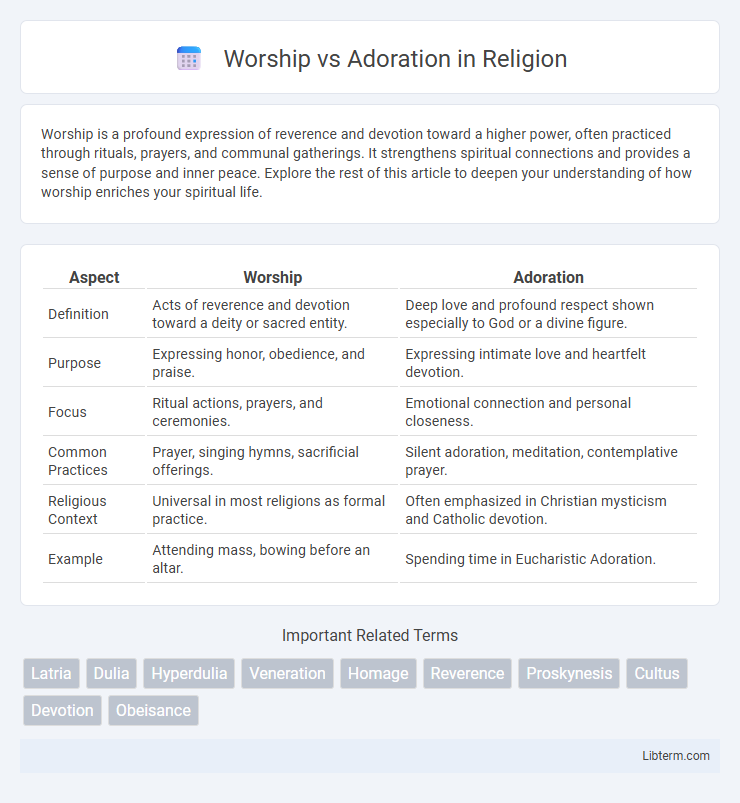Worship is a profound expression of reverence and devotion toward a higher power, often practiced through rituals, prayers, and communal gatherings. It strengthens spiritual connections and provides a sense of purpose and inner peace. Explore the rest of this article to deepen your understanding of how worship enriches your spiritual life.
Table of Comparison
| Aspect | Worship | Adoration |
|---|---|---|
| Definition | Acts of reverence and devotion toward a deity or sacred entity. | Deep love and profound respect shown especially to God or a divine figure. |
| Purpose | Expressing honor, obedience, and praise. | Expressing intimate love and heartfelt devotion. |
| Focus | Ritual actions, prayers, and ceremonies. | Emotional connection and personal closeness. |
| Common Practices | Prayer, singing hymns, sacrificial offerings. | Silent adoration, meditation, contemplative prayer. |
| Religious Context | Universal in most religions as formal practice. | Often emphasized in Christian mysticism and Catholic devotion. |
| Example | Attending mass, bowing before an altar. | Spending time in Eucharistic Adoration. |
Understanding Worship and Adoration: Key Definitions
Worship involves acts of reverence and devotion directed toward a deity, often expressed through rituals, prayers, and songs, emphasizing submission and honor. Adoration specifically refers to deep, heartfelt love and admiration for the divine, highlighting an intimate, emotional connection beyond formal acts. Understanding the distinction between worship as an external practice and adoration as an internal expression clarifies their complementary roles in spiritual life.
Historical Roots of Worship and Adoration
Worship and adoration both have deep historical roots tracing back to ancient civilizations where ritualistic practices aimed to honor gods and divine beings. Worship typically involved formal ceremonies, sacrifices, and communal prayers signifying reverence and obedience to deities, while adoration evolved as a more intimate, personal expression of love and devotion. Historical texts from Mesopotamia, Egypt, and early Christian writings highlight worship's structured nature compared to the emotional and contemplative tones embodied in adoration.
Worship vs Adoration: Core Distinctions
Worship involves reverence and acts of devotion directed toward a deity, emphasizing rituals, prayers, and obedience. Adoration centers on deep love and heartfelt admiration, reflecting an intimate emotional connection rather than formal ceremonies. The core distinction lies in worship as structured reverence, while adoration represents personal, profound affection.
Theological Perspectives on Worship and Adoration
Theological perspectives distinguish worship as the act of acknowledging God's supreme authority and expressing reverence, while adoration emphasizes deep love and heartfelt devotion towards the divine. Worship involves communal rituals and liturgical practices rooted in scripture, reflecting God's majesty and holiness. Adoration, often more personal and intimate, highlights the believer's emotional connection and sustained praise, reinforcing the relational aspect of faith.
Expressions of Worship in Various Faiths
Expressions of worship in various faiths range from ritualistic prayers, chanting, and singing hymns to offerings and sacrificial acts reflecting reverence towards a deity. Adoration, often seen as a deeper, more intimate form of worship, manifests through silent meditation, contemplation, and heartfelt devotion aimed at establishing a personal connection with the divine. Diverse traditions such as Hinduism, Christianity, and Islam emphasize physical gestures like bowing, prostration, and lighting candles as symbolic acts embodying both worship and adoration.
The Role of Adoration in Spiritual Practice
Adoration plays a foundational role in spiritual practice by fostering a deep, reverential love for the divine that transcends formal worship rituals. It encourages personal connection and heartfelt devotion, emphasizing the internal experience of love and awe rather than external expressions. This intimate engagement through adoration cultivates spiritual growth, humility, and a sustained sense of presence within religious disciplines.
Worship and Adoration in Sacred Texts
Worship in sacred texts is often described as acts of reverence and obedience directed towards a deity, involving rituals, prayers, and sacrifices to honor divine authority. Adoration, while closely related, emphasizes deep love and heartfelt devotion, reflecting an intimate, personal connection with the divine presence. Scriptural examples include Psalm 95:6 highlighting worship through bowing before God, while the Song of Solomon illustrates adoration through expressions of love and desire for closeness with the divine.
Emotional and Spiritual Impact of Each Practice
Worship evokes a profound emotional connection by fostering a shared sense of reverence and communal belonging, often manifested through rituals and collective expressions of faith. Adoration, on the other hand, cultivates an intimate spiritual experience centered on personal devotion and deep love for the divine, enhancing inner peace and individual transformation. Both practices significantly impact believers by nurturing a sacred bond, yet worship emphasizes external acknowledgment, while adoration intensifies internal spiritual communion.
Worship and Adoration in Contemporary Communities
Worship in contemporary communities often involves collective rituals, music, and prayer aimed at expressing reverence and seeking connection with a higher power. Adoration is more intimate, focusing on deep, personal devotion and heartfelt admiration toward the divine presence. Both practices contribute significantly to spiritual identity and communal cohesion in modern faith settings.
Choosing Between Worship and Adoration: Practical Guidance
When choosing between worship and adoration, understanding their distinct purposes helps clarify the decision: worship often involves communal expressions and formal rituals, while adoration is deeply personal and focused on reverence. Practical guidance suggests prioritizing adoration during private devotion to foster intimate connections with the divine, whereas worship suits structured group settings and traditional ceremonies. Balancing both practices enhances spiritual growth by integrating heartfelt adoration with collective worship experiences.
Worship Infographic

 libterm.com
libterm.com